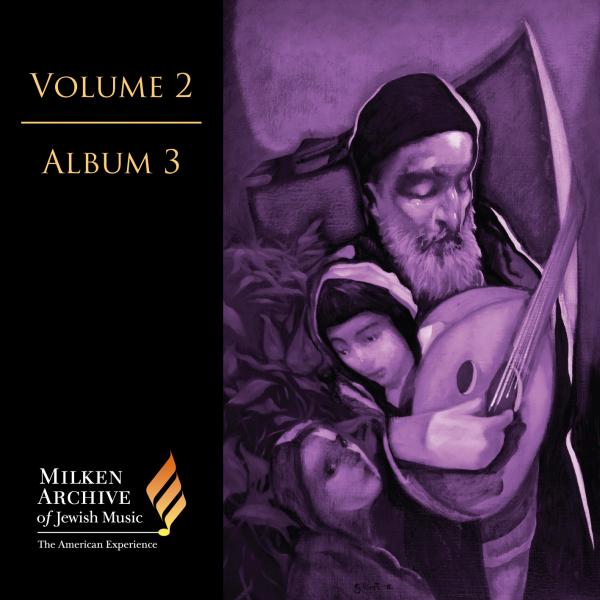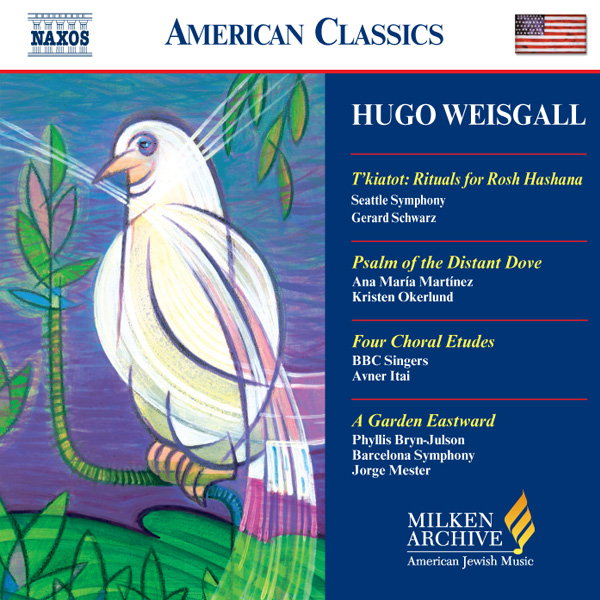Tracks
Liner Notes
A Garden Eastward, written between August and November 1952, is subtitled Cantata for High Voice and Orchestra. At its 1953 premiere, however, sung by Brenda Lewis with the Baltimore Symphony conducted by Massimo Freccia, the work was subtitled Three Symphonic Songs. Indeed its structure of three contrasting movements—Fantasia, Scherzo, and Free Variations—qualify it as the closest thing to a symphony for voice and orchestra among all of Weisgall’s works. Certainly it is one of his most rhapsodic orchestral conceptions, and this composer of so much craggy, chromatic music remarked more than once that he thought it his “most beautiful” piece.
A Garden Eastward is a setting of Milton Feist’s English versions of medieval poetry by the great Spanish Hebrew poet and philosopher Moses ben Jacob Ibn Ezra [a.k.a. Abu Harun; ca. 1055–1135]. The fantasia opens with two spare intertwining strands of stratospherically high pianissimo counterpoint for the violins, whose tonal and rhythmic vagueness portray the poet’s dreamlike reverie on how the wonders of the created universe declare the Eternal One’s greatness (Ibn Ezra’s poem is a visionary meditation on Psalm 8:4). Weisgall’s free melodic lines are lyrical but nonrepetitive, constructed from small melodic or intervallic cells. Eventually the enigmatic chromaticism blazes out into more diatonic vocal melody, polytonally superimposed upon orchestral chords at the words “Yonder shines the sun!” The reverie slowly fades into mists of sumptuous open harmonies as the movement closes.
The scherzo became Weisgall’s favorite form early on in his compositions. Its brisk exciting pace, its inherent capacity for irregular regroupings of beats and measures, and its formal adaptability made it an indispensable organizing technique for sections of operas, vocal chamber works, and orchestral pieces. Weisgall’s reading of Ibn Ezra’s vision of a luxurious Moorish garden in Moslem Spain (or is it the Garden of Eden or the backdrop to the Song of Songs?) is vigorous and almost brash, as if the mock anger of the opening words, “Call the man traitor,” never settles into rapture.
The concluding free variations are based on a traditional German Ashkenazi synagogue melody Weisgall’s father had known and sung at his pulpit in Moravia, which was ingrained in central European liturgical repertoires. (In 1950 it was published in the privately issued Shirei hayyim ve’emuna; Songs of Life and Faith.) The tune is one of many that were known in western and central Europe for the text adon olam, a majestic hymn of praise for God. The poem is most commonly sung at the conclusion of the musaf service on Sabbaths, High Holy Days, and Festivals and at the conclusion of evening services on those occasions. (It also occurs within the weekday morning liturgy, but it would not normally be sung to a tune of this type.) Weisgall’s recollection was that this particular melody was reserved in his father’s tradition for the evening services on Rosh Hashana and Yom Kippur. The solo trumpet hints at the tune’s melodic content in a chorale-like and highly dissonant brass introduction.
The soprano then intones the theme, accompanied by flowing, nontonal lines drawn from fragments of the original melody. These ever-present fragments, which vary and combine with new material in the orchestra and in the soloist’s cantillation-like lines, correspond to the poet’s words of ancient wisdom that endlessly adorn and inspire him in old age as he “scales the heights” toward eternity. Characteristically for Weisgall, this ethereal work ends in a kind of cadential, “consonant” resolution.
If the synagogue tune in the last movement seems to disappear as the movement progresses, that is in the long tradition of the great variations of Bach, Beethoven, Brahms, and others, in which the theme is a point of departure for new invention that assumes the foreground. Rarely performed but admired by cognoscenti, A Garden Eastward stands next to other great works of this genre by Berlioz, Mahler, Ravel, Weisgall’s teacher Roger Sessions, and his student Dominick Argento.
Lyrics
Sung in English
FANTASIA
My dreams rouse me
That I may behold Thee in visions.
Before mine inmost sight
They display Thy majesty.
They teach me to tell of Thy wonders
Each time I look to the heavens
The work that Thy fingers have wrought.
The circling spheres take their destined course
That spins them round as does the potter’s turning wheel.
Better than lips, their way to tell Thy glory.
In their midst the earth hangs unmoved,
Held fast by the cords of Thy love.
Yonder shines the potent sun!
With light to spare, it endows the moon.
The stars unfold in a blossoming garden.
Through such as these we come to know
How deep Thy plan.
SCHERZO
Call the man traitor who rejects
The discourse of the nightingale
Proclaiming from his branch,
“Drink deep this time of roses
Turn from the way of the heavy in spirit.”
We came on gardens of myrtle,
And there we rested, carefree, in their shade.
Then the trees of the garden began to rustle,
And to our ears there came
The clamor of many birds.
Behold, the cloud gives suck to the garden
And beats down its furrows of fine dust.
So do the mouths of the blossoms smile
While the eyes of heaven are weeping.
A woman’s face, a garden, and a cup of wine,
The cry of birds, the murmur of flowing waters,
Such things are balm to desire, a joy to the careworn,
A song to the wanderer,
Healing to the sick, and wealth to the poor.
FREE VARIATIONS
I have chosen as my portion
The wisdom of those who passed before us,
And their words are a balm for the pangs of my grief.
With them I take sweet counsel
Because they are the treasure of the faithful.
Floating within the sea of their deep thoughts,
I gather pearls for the adornment of my throat.
Mine eyes and my heart shall find delight in them.
My lips shall make response to them in joy.
They brighten mine eyes, and are a song in my ears.
Their flavor is honey in my mouth;
Like cinnamon, their fragrance in my nostrils.
Through them, through them I scale the heights.
They are my glory!
Therefore I mediate upon them all the days I live.
From them flow the ever living waters.
Credits
Composer: Hugo WeisgallPerformers: Barcelona Symphony-National Orchestra of Catalonia; Phyllis Bryn-Julson, Soprano; Jorge Mester, Conductor
Publisher: Theodore Presser Co.
Texts: Moses Ibn Ezra
Translation: Milton Feist

